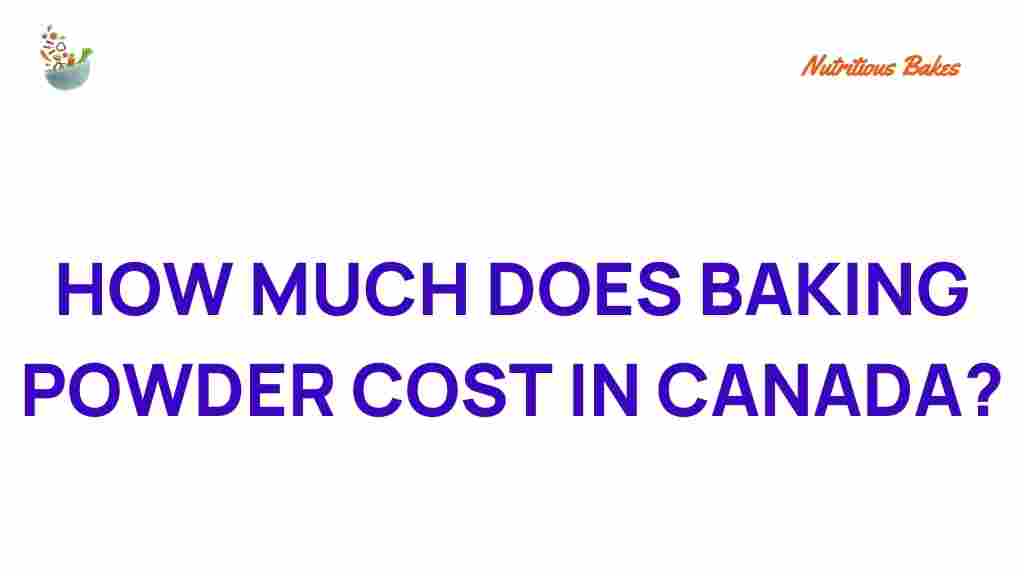Uncovering the Hidden Costs of Baking Powder in Canada
Baking powder is a kitchen essential known for its role in making baked goods rise, from fluffy cakes to light biscuits. However, many Canadian consumers may not realize that the cost of baking powder can significantly impact their overall grocery expenses. This article delves into the hidden costs of baking powder in Canada, exploring prices, budgeting tips, and consumer insights to help you make informed decisions about your baking ingredients.
The Role of Baking Powder in the Kitchen
Understanding the significance of baking powder is crucial for any home baker. This leavening agent is a combination of an acid and a base, typically baking soda and cream of tartar, which reacts with moisture and heat to create carbon dioxide bubbles. These bubbles cause the dough or batter to rise, resulting in the light, airy texture that is characteristic of many baked goods.
Baking Powder Prices in Canada
The price of baking powder in Canada can vary greatly depending on several factors, including brand, packaging size, and store location. On average, consumers can expect to pay:
- Small (227g) container: $2.00 – $4.00
- Medium (454g) container: $4.00 – $6.00
- Bulk options (1kg or more): $6.00 – $12.00
These prices can fluctuate based on promotions, seasonal demand, and regional differences. Understanding these costs is essential for effective budgeting in your grocery shopping.
Factors Influencing Baking Powder Costs
Several factors influence the prices of baking powder in Canada:
- Brand Reputation: Well-known brands may charge a premium compared to generic options.
- Packaging: Larger containers often provide better value per gram but may require more upfront investment.
- Store Location: Prices can vary between urban and rural areas, as well as between different grocery chains.
- Market Trends: Changes in supply chain dynamics, including shipping costs and availability of raw materials, can affect pricing.
Consumer Insights on Baking Powder Usage
To gain a better understanding of how Canadians perceive the cost of baking powder, we conducted a survey among home bakers. Here are some key insights:
- Approximately 60% of respondents reported purchasing baking powder at least once a month.
- Over 75% consider price as a significant factor when selecting a baking powder brand.
- Many consumers expressed a willingness to try generic brands if they offer a lower price without compromising quality.
These insights highlight the importance of pricing transparency and consumer education when it comes to kitchen essentials like baking powder.
Budgeting for Baking Ingredients
When budgeting for baking ingredients, it’s essential to consider the cumulative costs of all items needed for your recipes. Here are some tips to help you manage your grocery costs effectively:
- Buy in Bulk: Purchasing larger quantities of baking powder and other staples can save money in the long run.
- Compare Prices: Use grocery apps or websites to compare prices at different stores before making a purchase.
- Plan Your Recipes: Create a meal plan that incorporates recipes using baking powder to minimize waste.
- Look for Sales: Keep an eye out for promotions or discounts on baking ingredients to stock up when prices are low.
Step-by-Step Process: How to Choose the Right Baking Powder
Selecting the right baking powder goes beyond just price. Here’s a step-by-step guide to help you choose the best baking powder for your needs:
- Identify Your Needs: Consider what types of recipes you’ll be baking. Do you need a fast-acting baking powder for quick recipes?
- Evaluate the Ingredients: Check the label for any additional ingredients that may affect dietary restrictions.
- Compare Prices: Look at the cost per gram to determine the best value for your budget.
- Read Reviews: Consumer reviews can provide insights into the effectiveness and quality of different brands.
- Check the Expiration Date: Ensure you’re buying fresh baking powder, as its effectiveness diminishes over time.
Troubleshooting Common Baking Powder Issues
Even with the right baking powder, sometimes things don’t go as planned. Here are some troubleshooting tips for common issues:
- Flat Baked Goods: This could be due to old baking powder. Always check the expiration date and perform a freshness test by adding a teaspoon of baking powder to hot water. It should fizz if it’s still active.
- Overly Dense Cakes: Adding too much baking powder can lead to a dense texture. Stick to the recipe measurements for best results.
- Unpleasant Taste: If your baked goods have a metallic taste, it may be due to using too much baking powder. Adjust your measurements accordingly.
Conclusion: Understanding the Full Cost of Baking Powder
In Canada, the cost of baking powder is just one component of the broader food economy that affects grocery costs. By uncovering the hidden costs associated with baking powder and understanding consumer insights, you can make better-informed decisions about your kitchen essentials.
Budgeting effectively for baking ingredients involves more than just looking at price tags. It requires a strategic approach to purchasing and using these essentials wisely. By following the tips outlined in this article, you can enjoy baking without breaking the bank.
For more insights on budgeting and grocery costs, check out this comprehensive guide on food budgeting. To explore different baking powder options available in Canada, visit this resource.
This article is in the category Ingredients and created by NutritiousBakes Team
